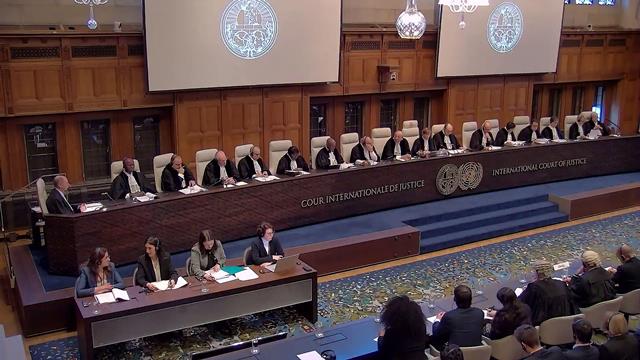 26 January 2024: The ICJ courtroom ahead of an interim ruling in Gaza genocide case against Israel made by South Africa in the Hague. [photo: by ICJ/ UPI/Alamy]
26 January 2024: The ICJ courtroom ahead of an interim ruling in Gaza genocide case against Israel made by South Africa in the Hague. [photo: by ICJ/ UPI/Alamy]
[This is an excerpt from an article in The Round Table: The Commonwealth Journal of International Affairs. Opinions do not reflect the position of the editorial board.]
The submissions before the International Court of Justice (ICJ) in January and February on the charge of Israeli genocide in Gaza and the request for an advisory opinion pertaining to the legal consequences of acts by Israel in Occupied Palestinian Territory bring into sharp focus the much-maligned role of international law in the world.
Small states particularly, like many in the Commonwealth, often voice the need for the protection international law affords them, even if not sufficiently. In the world of power politics, that protection is all too often just a moral or symbolic shield. It is of no practical consequence.
It is claimed modern International law originated with Dutch jurist Hugo Grotius (1583–1645). It was for the longest time the preserve of ‘civilised nations’ with non-European ‘uncivilised’ countries excluded.
It was not until Japan gave Russia a bloody nose (in the 1904-05 Russo-Japanese war) that an ‘uncivilised’ nation was invited to the Hague Peace Conference of 1907, which established the laws and customs of war and the rules belligerents must follow during hostilities. The Japanese representative stated with barely disguised sarcasm: ‘We showed ourselves to be your equal in the art of scientific butchery, and at once we are invited to your councils as a “civilised” nation’.
Russia invaded Ukraine in February 2022 and one of the arguments Moscow used for the clear violation of the territorial integrity of another state was a right to pre-emptive self-defence, citing the likely expansion of NATO to its doorstep, not a forlorn argument, as shown by the number of countries falling for it.
In 2016, despite the risk of antagonising China, Singapore publicly pronounced that the decision of an arbitration tribunal that Beijing’s claim to almost all of the South China Sea had no basis in international law, should be respected. The Chinese media ranted against ‘the little red dot’, and China shut Singapore out for a while, but the island Republic emerged unscathed. The Singapore government stated that, more than bigger states, small countries needed the protection of international law.
With regard to the cases brought against Israel before the ICJ, there is a new twist in that second tier and weaker states have taken legal action as a countermeasure to determine obligations and rights in law, in a situation charged with high emotion and righteousness. They concluded that there is no other recourse to stop the carnage in the Middle East than to appeal to international law.
South Africa took Israel to task under the Genocide Convention, in a substantive case yet to be determined, but with provisional orders already issued which Israel must take to limit harm and destruction in Gaza.
While the ICJ’s provisional orders have not deterred Israel, it has an international legal cross to bear in a situation of mounting pressure to cease and desist from indiscriminate military acts of vengeance.
The other case before the ICJ is to seek its advisory opinion on the legal consequences of Israeli policies and acts since 1967 in territories demarcated as Palestinian by UN resolutions. With 52 states and three international organisations involved, this is almost like a class action.
Do these legal actions against Israel mean a better recognised role for international law than has hitherto been the case? Some commentators have argued that these actions are nothing more than a cynical use of international law as an instrument of international politics. But it is worth remembering that this has always been the case – from the time international law was fit for European purpose only to when Japan was invited to join the club and to so many later events in the contemporary world.
Munir Majid is a Visiting Senior Fellow, Centre for International Affairs, Diplomacy and Strategy (IDEAS), London School of Economics, London, UK.



